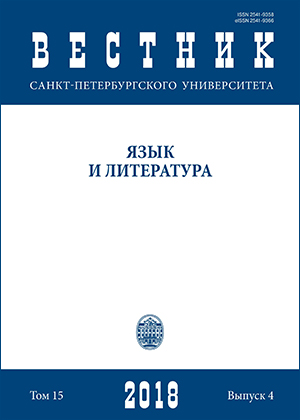Text-in-text and the paradoxes of set theory
DOI:
https://doi.org/10.21638/11701/%20spbu09.2018.409Abstract
M. Markovich believed that the meaning-generating “truth of the paradox arises and can exist only in the oscillation between two (or several) opposing truths”. Referring to Yu. M.Lotman, he wrote that a text can be perceived by the reader as an equivalent of reality only if it can not be reduced at any level “to a united, comprehensive and complete system”. Markovich refers to Lot-man pointing out the paradoxical nature of the relationship between teхt and language. A text is written (coded) in a certain language, and at the same time the language (code) is contained in the text itself. The composition “text in the text” is a variation of such paradoxical structure. Using works of M.Bulgakov, V.Nabokov, A.Bitov and S.Nosov as examples, the article shows that with such a composition the nested structure only seems to be an element of the text, while at the same time it can contain the whole as its own element. Therefore, this means that text as a whole contains itself as its element. In set theory, a set that includes itself as its element is called reflexive. It is one of the most well-known paradoxes of set theory that is connected with the properties of reflexive sets, namely the Russell paradox, built on the coincidence of the message and the code. Since the scientific discourse assumes that the message should be different from the code, the discovery at the beginning of the 20thcentury of a whole series of such paradoxes led to the creation of new axiomatic systems in which the construction of reflexive sets was not allowed. The construction of reflexive sets in the framework of an artistic text that is inadmissible for an exact science becomes a dynamic meaning-generating structure.
Keywords:
paradox, realism, composition, set theory, semiotics
Downloads
References
Давыдов 2004 — Давыдов С. С. «Тексты-матрешки» Владимира Набокова. СПб.: Кирцидели, 2004.
Лотман 1992а — Лотман Ю. М. Мозг — текст — культура — искусственный интеллект. В кн.: Лотман Ю. М. Избранные статьи. В 3 т. Т. 1. Таллинн: Александра, 1992. С. 25–33.
Лотман 1992б — Лотман Ю. М. Текст в тексте. В кн.: Лотман Ю. М. Избранные статьи. В 3 т. Т.1. Таллинн: Александра, 1992. С. 148–160.
Маркович 1969 — Маркович В. М. Юмор и сатира в «Евгении Онегине». Вопросы литературы. 1969, 1: 67–88.
Маркович 2008 — Маркович В. М. Парадокс как принцип построения характера в русском романе XIX в. В кн.: Маркович В. М. Избранные работы. СПб.: Ломоносовъ, 2008. С. 290–304.
References
Давыдов 2004 — Davydov S. S. «Teksty-matreshki» Vladimira Nabokova. St. Petersburg: Kircideli Publ., 2004. (In Russian)
Лотман 1992а — Lotman Yu. M. Mozg — tekst — kultura — iskusstvennyj intellekt. In: Lotman Yu. M. Izbrannye stati. In 3 vols. Vol. 1. Tallinn: Aleksandra Publ., 1992. P. 25–33. (In Russian)
Лотман 1992б — Lotman Yu. M. Tekst v tekste. In: Lotman Yu. M. Izbrannye stati. In 3 vols. Vol. 1. Tallinn: Aleksandra Publ., 1992. P. 148–160. (In Russian)
Маркович 1969 — Markovich V. M. [Humour and satire in “Eugene Onegin”]. Literary Topics. 1969, 1: 67–88. (In Russian)
Маркович 2008 — Markovich V. M. Paradoks kak printsip postroeniia kharaktera v russkom romane XIX v. In: Markovich V. M. Izbrannye raboty. St. Petersburg: Lomonosov Publ., 2008. P. 290–304. (In Russian)
Downloads
Published
How to Cite
Issue
Section
License
Articles of "Vestnik of Saint Petersburg University. Language and Literature" are open access distributed under the terms of the License Agreement with Saint Petersburg State University, which permits to the authors unrestricted distribution and self-archiving free of charge.






